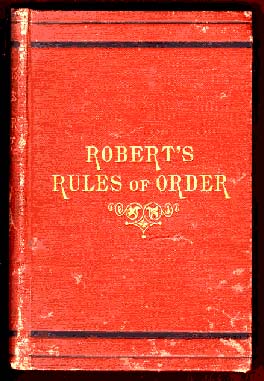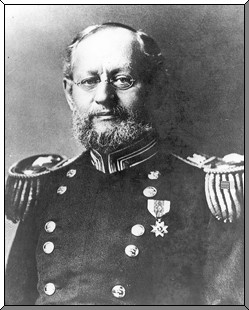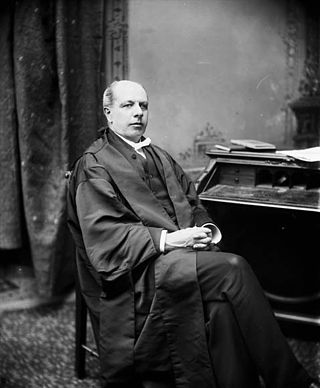Related Research Articles
A deliberative assembly is a meeting of members who use parliamentary procedure.

Robert's Rules of Order, often simply referred to as Robert's Rules, is a manual of parliamentary procedure by U.S. Army officer Henry Martyn Robert. "The object of Rules of Order is to assist an assembly to accomplish the work for which it was designed [...] Where there is no law [...] there is the least of real liberty." The term Robert's Rules of Order is also used more generically to refer to any of the more recent editions, by various editors and authors, based on any of Robert's original editions, and the term is used more generically in the United States to refer to parliamentary procedure. It was written primarily to help guide voluntary associations in their operations of governance.

Parliamentary procedures are the accepted rules, ethics, and customs governing meetings of an assembly or organization. Their object is to allow orderly deliberation upon questions of interest to the organization and thus to arrive at the sense or the will of the majority of the assembly upon these questions. Self-governing organizations follow parliamentary procedure to debate and reach group decisions, usually by vote, with the least possible friction.

McClelland & Stewart Limited is a Canadian publishing company. It is owned by Penguin Random House of Canada, a branch of Penguin Random House, the international book publishing division of German media giant Bertelsmann.

Henry Martyn Robert was an American soldier, engineer, and author. In 1876, Robert published the first edition of his manual of parliamentary procedure, Robert's Rules of Order, which remains today the most common parliamentary authority in the United States.

Sir John George Bourinot, was a Canadian journalist, historian, and civil servant, sole author of the first Canadian effort in 1884 to document Parliamentary Procedure and Practice, and remembered as an expert in parliamentary procedure and constitutional law.
A parliamentary authority is a book of rules for conducting business in deliberative assemblies. Several different books have been used by legislative assemblies and by organizations' deliberative bodies.
Proxy voting is a form of voting whereby a member of a decision-making body may delegate their voting power to a representative, to enable a vote in absence. The representative may be another member of the same body, or external. A person so designated is called a "proxy" and the person designating them is called a "principal". Proxy appointments can be used to form a voting bloc that can exercise greater influence in deliberations or negotiations. Proxy voting is a particularly important practice with respect to corporations; in the United States, investment advisers often vote proxies on behalf of their client accounts.
In parliamentary procedure, reconsideration of a motion may be done on a matter previously decided. The motion to "reconsider" is used for this purpose. This motion originated in the United States and is generally not used in parliaments. A special form of this motion is reconsider and enter on the minutes.
In certain countries, a motion in parliamentary procedure is a formal proposal by a member of a deliberative assembly that the assembly take certain action. Such motions, and the form they take are specified by the deliberate assembly and/or a pre-agreed volume detailing parliamentary procedure, such as Robert's Rules of Order; The Standard Code of Parliamentary Procedure; or Lord Citrine's The ABC of Chairmanship. Motions are used in conducting business in almost all legislative bodies worldwide, and are used in meetings of many church vestries, corporate boards, and fraternal organizations.
In the United States, a parliamentarian is an expert on parliamentary procedure who advises organizations and deliberative assemblies. This sense of the term "parliamentarian" is distinct from the usage in parliamentary republics and monarchies as a synonym for member of parliament.
In parliamentary procedure in the United States, a motion to postpone to a certain time is used to delay action on a pending question until a different day, meeting, hour or until after a certain event. Then, when that time comes, the consideration of the question is picked up where it was left off when it was postponed.

Demeter's Manual of Parliamentary Law and Procedure is a parliamentary authority manual by George Demeter. It is included in the bank of study materials used in preparing for the Certified Parliamentarian (CP) designation offered by the American Institute of Parliamentarians. Similar to Robert's Rules of Order, Demeter's Manual notes, "Without rules, there would be injustice and confusion. Hence, it is as necessary to follow the rules of parliamentary law as it is to follow the rules of a ball game or a card game." The book attempts to include everything a presiding officer might need to know, including public courtesies and ceremonies; sample prayers for opening a meeting; organizing a new lodge, chapter or post; times of fraction and discord; acquisition of new members; installation of officers; and adjournment. Chapter 16 contains an "entire meeting in drill form," designed to illustrate a range of parliamentary motions and situations and how a chairman would handle them. Demeter also devotes space to discussing strategic use of parliamentary procedure. The book concludes with "The Greatest Convention Ever Held", an account of the Creation in parliamentary terms.
Parliamentary procedure in the corporate world may follow traditional parliamentary authorities such as Robert's Rules of Order or simpler rules of order considered by some commentators to be more appropriate in the corporate setting.
In parliamentary procedure, requests and inquiries are motions used by members of a deliberative assembly to obtain information or to do or have something done that requires permission of the assembly. Except for a request to be excused from a duty, these requests and inquiries are not debatable nor amendable.
The history of parliamentary procedure refers to the origins and evolution of parliamentary law used by deliberative assemblies.
In parliamentary procedure, the verb to table has the opposite meaning in the United States from that of the rest of the world:
Douglas Benjamin Woodworth, was a lawyer and member of the Woodworth political family from Nova Scotia, Canada. He represented Kings in the House of Commons of Canada from 1882 to 1887 as a Liberal-Conservative member.

Isabel Ecclestone Mackay was a Canadian novelist and poet.
References
- ↑ Margaret Banks (23 April 2001). Sir John George Bourinot, Victorian Canadian: His Life, Times, and Legacy. McGill-Queen's Press - MQUP. pp. 7–. ISBN 978-0-7735-6926-3.
- ↑ Law Library Journal. Vol. 80. American Association of Law Libraries. 1988. p. 190.
- ↑ The Canadian Railway Employees' Monthly. Vol. 38. Canadian Brotherhood of Railway Employees and Other Transport Workers. 1952. p. 54.
- ↑ "Sir John George Bourinot; a brief bibliography" . Retrieved 2014-06-21.
- ↑ Municipal World. Vol. 85. Municipal World. 1975. pp. 54, 258.
- ↑ "The Canadian Encyclopedia on Bourinot's Rules of Order" . Retrieved 2016-03-31.